It’s time to shed a tear for Vancouver’s lowly homeowners.
B.C. Assessment numbers released Jan. 2 point to across-the-board drops in almost every land classification in Vancouver, including single-family homes (11 per cent), strata, condos and apartments (seven per cent) and even some commercial properties (up to a 15 per cent decreased assessment).
A single family home assessed at $1.75 million as of July 1, 2018 was assessed at $1.56 million a year later.
To put those numbers in perspective, here are a couple of year-over-year comparisons on either side of the city for houses and apartments of comparable size.
A single family home near West 15th and Dunbar was assessed at $2.12 million this year, compared to $2.36 million in 2018. An apartment on York Avenue near Cypress Street rang in at $996,000 this year versus $1.15 million one year ago.
On the other side of town, a single family home near Nanaimo Street and East 15th Avenue was assessed at $1.69 million this year and $1.89 million last year. An apartment near Nanaimo and East 11th checked in at $809,000 this year versus $856,000 last year.
“We are seeing that the assessments have seen decreases or are remaining stable on the residential side,” B.C. Assessment deputy assessor Brian Smith told the Courier Thursday morning.
The hard-done-by folks in the University Endowment Lands can expect an even more severe haircut, with average assessments dropping by 16 per cent. Alas, a $5.9 million property has fallen to $4.95 million.
The seven per cent drop for strata, condo or apartment owners translates to an average $55,000 decrease — from $740,000 to $686,000. That’s a 13 per cent swing from last year’s report, when the same property class saw an average six per cent increase.Ěý
The lone land type to come out ahead — — is the industrial land sector.
In that context, assessments range from a five per cent drop to a 20 per cent gain. Commercial properties are seeing a wide swing, ranging from a five per cent drop to 20 per cent gains.
“It’s supply and demand, especially on the industrial side,” Smith said. “Industrial land is in on hot demand so that’s definitely going to be driving up the price on those things and [it’s] similar with commercial.”
The numbers contained in the report reflect assessed values as of July 1, 2019 and take into account a number of metrics: current sales in the area, property size, age, quality, condition, view and location.
Last year’s report showed an average four per cent drop in the assessed value of single-family homes across Vancouver. Homes assessed on July 1, 2017 were typically in the range of $1.82 million, while numbers from July 1, 2018 sat at $1.75 million.
Those prices jump dramatically in the University Endowment Lands: 2017 assessments averaged around $6.66 million, while the 2018 numbers clocked in at a paltry $5.9 million. It was an average downward shift of 11 per cent.
Last year’s assessments for condos and strata properties in Â鶹´«Ă˝Ół»saw a six per cent increase in assessment, jumping from an average of $700,000 to $740,000.
Property owners who can appeal their assessments by Jan. 31 and those appeals are heard between Feb. 1 and March 15.
@JohnKurucz
Ěý
Ěý



